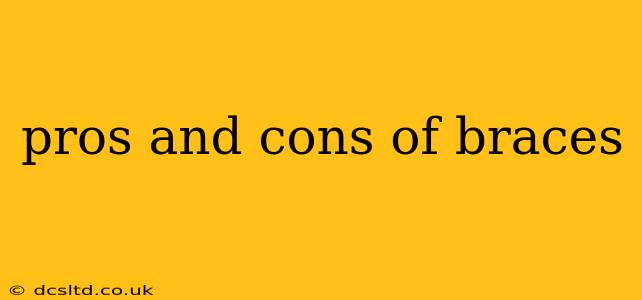Thinking about getting braces? It's a big decision, one that affects your appearance, your oral health, and your wallet. Understanding the pros and cons is crucial before you take the plunge. This comprehensive guide will explore both sides, helping you make an informed choice.
The Pros of Braces: A Healthier, Happier Smile
The benefits of orthodontic treatment extend far beyond aesthetics. While a straighter smile is a major draw, the advantages for your overall oral health are significant.
Improved Oral Hygiene
Straight teeth are easier to clean. Crowded or misaligned teeth create crevices where food particles and plaque can easily accumulate, leading to:
- Cavities: Bacteria thrive in these hard-to-reach areas, increasing your risk of tooth decay.
- Gum Disease (Gingivitis and Periodontitis): Plaque buildup irritates the gums, leading to inflammation and potentially more serious gum disease.
- Bad Breath: Food particles trapped between teeth contribute to unpleasant odors.
Braces effectively straighten your teeth, making it significantly easier to brush and floss thoroughly, minimizing these risks.
Improved Bite and Jaw Function
Malocclusion, or a bad bite, can cause various problems, including:
- TMJ Disorders (Temporomandibular Joint Disorders): Misaligned jaws can strain the jaw joints, leading to pain, clicking, and limited jaw movement.
- Chewing Difficulties: An improper bite can make chewing food efficiently challenging.
- Speech Impediments: In some cases, misaligned teeth can affect speech clarity.
Braces correct these bite issues, leading to improved jaw function and reducing the risk of related problems.
Enhanced Self-Esteem and Confidence
Let's face it: a straight, attractive smile significantly boosts self-esteem. For many, the improved appearance alone is a compelling reason to get braces. This enhanced confidence can positively impact various aspects of life, from social interactions to professional opportunities.
Long-Term Oral Health Benefits
The long-term benefits of correcting bite problems and improving oral hygiene are considerable. By preventing future dental issues, braces can save you money and discomfort in the long run.
The Cons of Braces: What to Expect
While the benefits are numerous, it's important to acknowledge the potential drawbacks.
Cost and Time Commitment
Braces are a significant investment, both financially and time-wise. Treatment can take anywhere from 12 to 36 months, requiring regular visits to the orthodontist. The total cost varies depending on the complexity of the case and the type of braces used.
Discomfort and Irritation
Initially, braces can cause some discomfort and irritation. Your teeth and gums may feel sore, particularly after adjustments. While this typically subsides, some discomfort is a normal part of the process. Special wax can help to reduce irritation.
Dietary Restrictions
Certain foods are off-limits while wearing braces. Hard, sticky, and crunchy foods can damage the braces or wires. This requires adjusting your diet, which can be challenging for some.
Increased Risk of Cavities (If Not Properly Cared For)
While braces improve oral hygiene when properly cared for, neglecting regular brushing and flossing can actually increase the risk of cavities. Food particles can become trapped more easily around the brackets and wires if not cleaned meticulously.
Potential for Minor Side Effects
Some individuals may experience minor side effects such as mouth sores, irritation of the cheeks, and temporary speech changes.
Frequently Asked Questions (Addressing People Also Ask)
Many questions arise when considering braces. Here are some common concerns:
How long does it take to get braces?
The treatment duration varies significantly depending on the complexity of the case. Treatment generally ranges from 12 to 36 months.
How much do braces cost?
The cost of braces varies greatly depending on the type of braces, your location, and the complexity of your treatment plan. It's essential to get a personalized cost estimate from your orthodontist.
Are braces painful?
Initially, you might experience some discomfort and soreness, especially after adjustments. However, the pain is usually manageable with over-the-counter pain relievers.
What foods can I not eat with braces?
Avoid hard, crunchy, sticky, and chewy foods that could damage your braces. This includes popcorn, hard candy, ice, and tough meats.
How do I care for my braces?
Meticulous oral hygiene is essential. Brush and floss carefully, paying attention to the areas around the brackets and wires. Use a soft-bristled toothbrush and interdental brushes to remove food particles effectively.
Conclusion: Making the Right Decision
The decision of whether or not to get braces is highly personal. Weighing the pros and cons carefully, considering your individual circumstances and consulting with a qualified orthodontist is crucial. A straight, healthy smile can significantly improve your quality of life, but it's vital to understand the potential challenges involved. Remember that meticulous oral hygiene is essential regardless of your choice.
